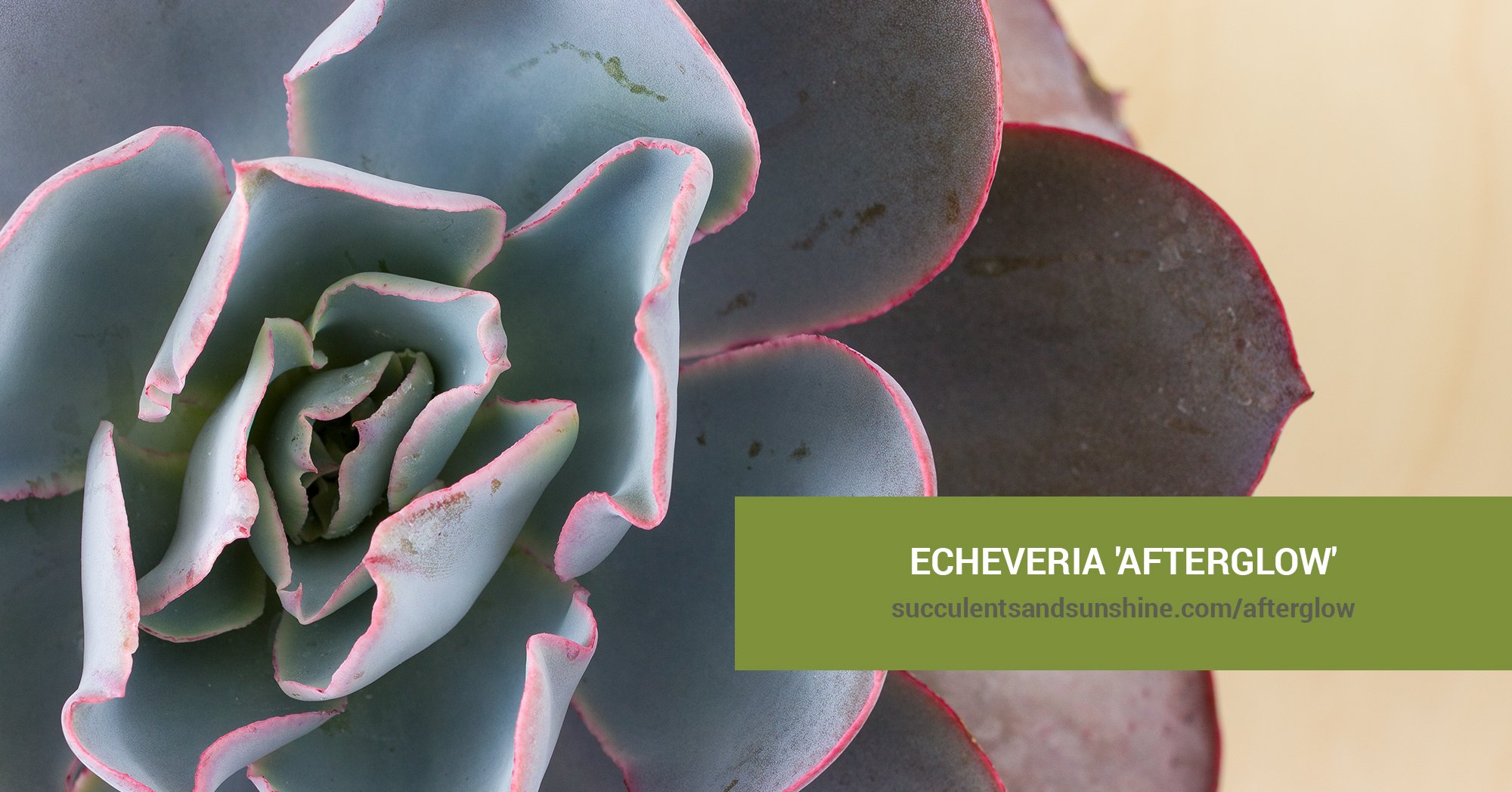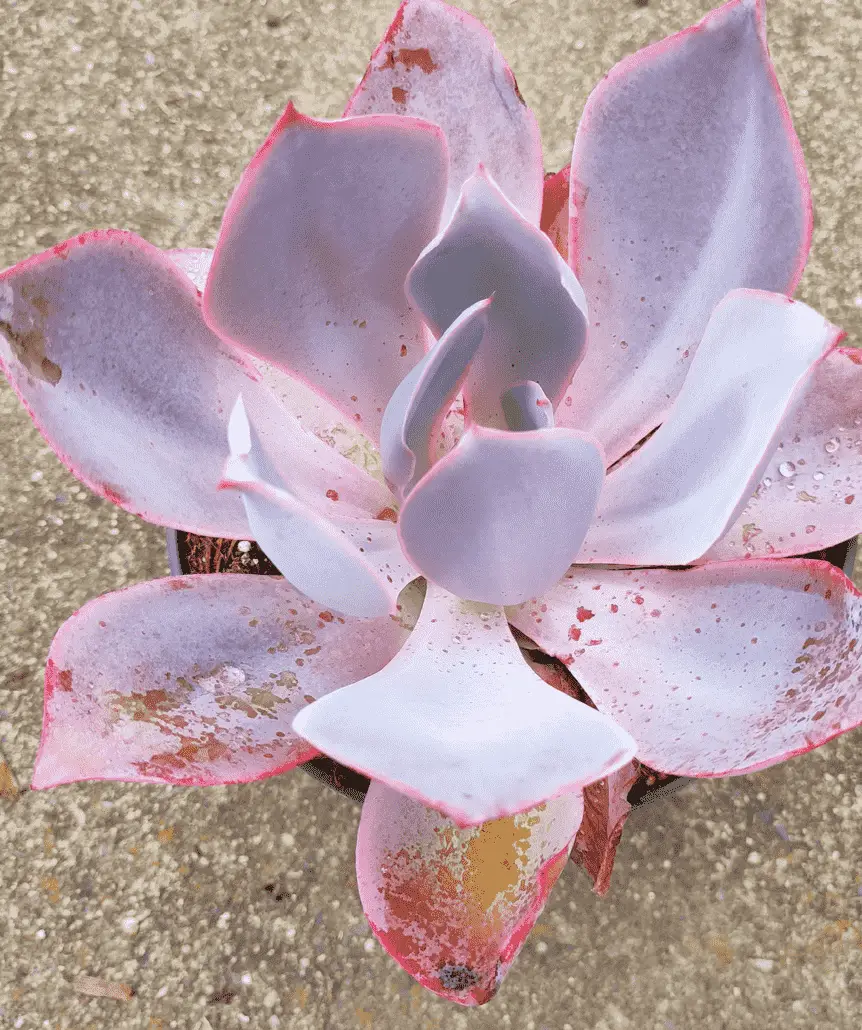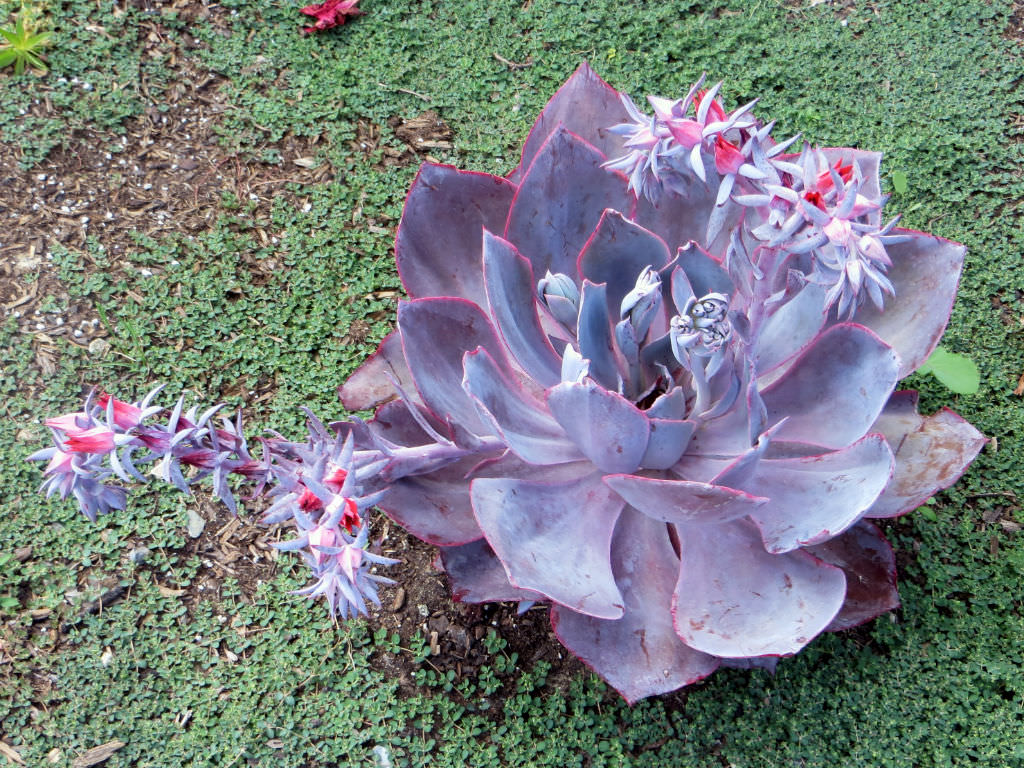
Massive Echeveria 'Afterglow' r/succulents
How to Propagate Echeveria 'Afterglow' From Cuttings. When propagating Afterglow from cuttings, cut a leaf from the mother plant carefully with a clean knife or scissors. Before replanting, wait for a few days to allow it to callous. Use well-draining soil for your new succulent plant. Don't forget to water when the soil dries out.

Echeveria afterglow Suculentas, Cultivo, Ideias para jardim
Echeveria 'Afterglow' benefits from occasional fertilization during the growing season. Use a balanced, water-soluble fertilizer diluted to half strength. Apply the fertilizer once a month, following the manufacturer's instructions. Avoid fertilizing during the winter months when the plant is dormant.

Echeveria Afterglow Care Growing The Pink Edged Succulent Echeveria
Echeveria 'Afterglow' is a beautiful succulent that forms large rosettes of hot pink-edged leaves that emerge grey-green and flush pink and purple when exposed to bright sunlight. The rosettes grow on a short, stout stem and reach a diameter of 16 inches (40 cm).. Propagation: Echeveria 'Afterglow' can be propagated by leaves, offsets, and.

Echeveria 'Afterglow' World of Succulents
A cutting from the mother plant. To easily propagate Echeveria Afterglow, follow these steps: - Fill up your container with the soil. - Place the cutting into it and firm down around it so that there are no air pockets in between. The bottom of the stem should be about one inch below the surface of the soil.

Echeveria 'Afterglow' Succulents and Sunshine
Four Ways To Propagate Echeveria Succulents. There are four different ways you can propagate echeveria plants: Separating offsets. Leaf cuttings. Stem cuttings. Germinating seeds. Separation of offsets, the little clones that are also known as"chicks" or "pups," is the quickest and easiest way to propagate echeverias, although it can.

Echeveria 'Afterglow' Succulents and Sunshine
Echeveria Propagation Tips. There are a few ways to propagate echeveria. While it is possible to take a cutting, you'll need to top the entire plant. Don't worry, they're easy to root, and the remaining stem will grow new rosettes. Individual leaves can be propagated as well, but this can take a very long time to produce a sizable plant.

Echeveria Cubic Frost photo from the other day, reserved for a cloudy Tuesday! 💜💙 . A hybrid by
The echeveria afterglow succulent is a very beautiful, unique, popular succulent that is in the beautiful echeveria succulent family. This succulent has large blue rosette shaped leaves that look absolutely stunning.. HOW TO PROPAGATE THE ECHEVERIA AFTERGLOW. Leaves: For leaf propagation, gently just twist and pull the leaf very gently off.

Echeveria propagation it’s as simple as falling off a log! The Plant Enthusiast
Stem-cutting propagation is a great way to propagate your Echeveria. This method requires taking stem cuttings from existing plants, and then planting them in the soil or water. To start this process, you will need to find healthy stems that have at least two leaves attached. These can be cut off with a sharp knife or pruners.

Echeveria afterglow
Echeveria Afterglow is a delightful plant in the Crassulaceae family, renowned for its striking appearance, low maintenance requirements, and versatility. However, it still has specific requirements that should be followed to keep it healthy and thriving.. Propagation. Propagating Echeverias is easy with offsets or leaf cuttings during the.

Echeveria ‘Afterglow’ (Care Guide With Pictures) Succulents Network
To propagate Echeveria Afterglow from stem cuttings, you will need the following tools and materials: A healthy and mature Echeveria Afterglow plant; A clean and sharp pair of pruning shears or scissors; A clean and dry container or pot filled with a well-draining succulent soil mix; A spray bottle filled with water; Optional: rooting hormone.

10 Echeveria Afterglow leaf cuttings succulent cuttings leaf propagation pink succulents
Echeveria 'Afterglow' propagates from offsets. To be able to propagate from the mother plant, you might wait several years for the main plant to produce an offset. To start this process, use a sharp knife and remove an offset from the main plant. When you remove the offset, clean the extra soil from it.

Echeveria 'Afterglow' World of Succulents
Step 1 - Cut a stem from the main plant with a sharpened and sterilized knife or garden shears. Step 2 - Leave the stem in a dry and shaded area to allow it to develop calluses. Step 3 - If the stem has hardened enough, place it in a pot filled with well-draining soil. Step 4 - Check the moisture level of the soil.

Echeveria Afterglow eSucculent
Afterglow Echeveria (Echeveria 'Afterglow') Care Guide. The afterglow Echeveria variant is a unique succulent with its bright pink outlines and fire-colored under flowers. Hybridized between Echeveria cante and Echeveria shaviana, this variation was given its name for its soft, glowing rosettes and flowers. Afterglow Echeveria is highly valued by gardeners for its distinctive appearance and.

Echeveria holy gate doin’ her thing ♥ ♥ ♥ ♥ ♥ chubbyleafgardens succulents succulentgarden
Echeveria 'Afterglow' also benefits from some indirect light throughout the day as well, so make sure you give it enough space to soak up light without becoming too exposed to heat. Propagation Propagating succulents by leaves is a great way to grow new plants from existing ones.

Echeveria ‘Afterglow’ Rice Canyon Demonstration Gardens
Echeveria 'Afterglow' is not cold hardy, so if you live in a zone that gets colder than 20° F (-6.7° C), it's best to plant this succulent in a container that can be brought indoors.. How to Propagate Echeveria 'Afterglow' Echeveria 'Afterglow' can be propagated from offsets, stem cuttings, or leaves. Offsets 'Afterglow' will.

Echeveria Afterglow Succulent Landscaping, Succulents Garden, Pretty Plants, All Plants
How to Propagate Echeveria Afterglow. Propagating the plant is possible by taking stem or leaf cuttings during the warmer months, preferably at the start of spring. Offsets can be removed. Allow the cuttings or offsets to dry for several days before placing them in their own pots. When you start watering the young plants keep them on the dry side.